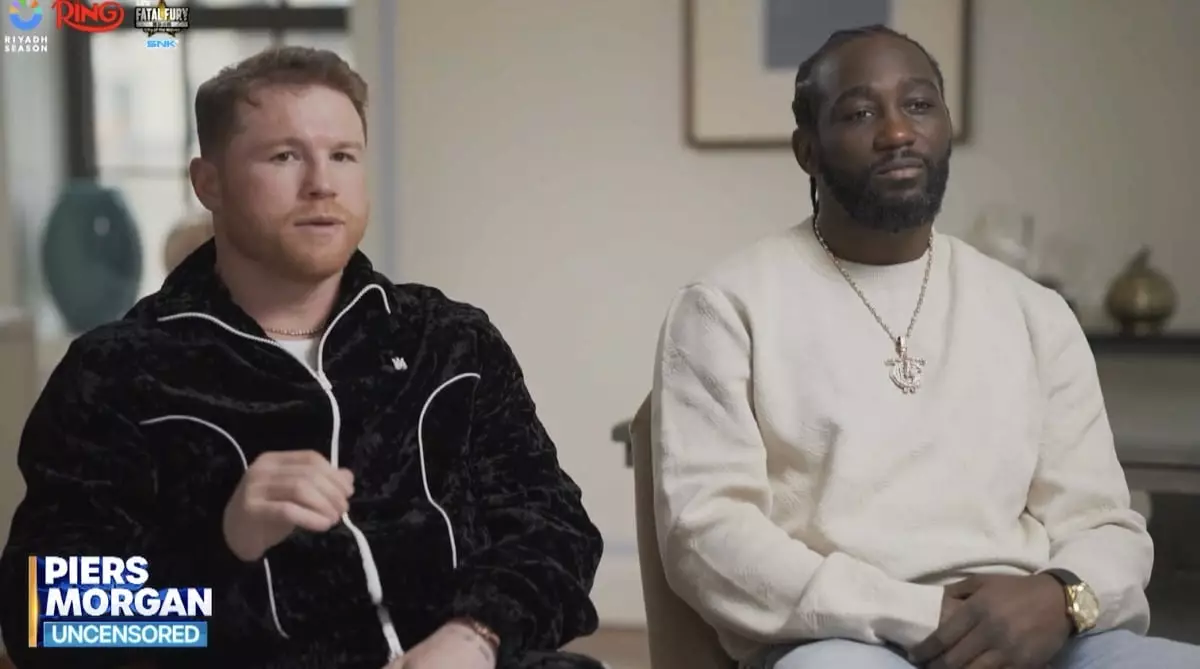With the boxing world buzzing, the upcoming clash between Terence Crawford and Canelo Alvarez on September 13 has been heralded as one of the most electrifying matchups in recent history. Their long-anticipated bout not only creates tension in the ring but also ignites discussions off it, particularly about the fighters’ contrasting perspectives on their chances of victory. In a recent interview with Piers Morgan, the air was thick with competitive spirit as Crawford proclaimed he has a 70% chance of emerging victorious — a bold claim that sets the stage for an intriguing fight.
Crawford’s percentage reveals a unique blend of confidence and realism that is often missing in the chaotic world of boxing. While many athletes might inflate their chances, he leveled it realistically. The choice of 70% suggests that while he feels poised for victory, he also respects the capabilities of his opponent. This candidness contrasts sharply with Canelo’s unwavering certainty; when asked about his chances, he jokingly opted for the smallest percentage — a mere 1%. This not only demonstrates Canelo’s confidence but also showcases a psychological game that is inherent in high-stakes matchups.
Legacy and Stakes
Embedded within their banter are deeper implications concerning legacy and future. The discussion extends beyond mere physical prowess; it touches on how winning or losing will influence their place in boxing history. For Crawford, a win against Canelo could solidify his standing as a boxing legend. His words, filled with determination, resonate with a desire not just to win but to etch his name in the annals of boxing glory.
Canelo, on the other hand, exudes a different sense of urgency. His glib admission of only needing a 1% chance reveals the relentless mentality that champions often embody — the idea that all it takes is one moment of brilliance. However, one could argue that such bravado might also reflect a hint of underlying pressure. After all, the weight of expectation can be burdensome when you’re already established in the limelight.
Candid Insights and Unfiltered Opinions
The interview also delved into more sensitive topics beyond the impending fight, such as the controversial bout between Mike Tyson and influencer Jake Paul. Crawford and Canelo expressed their dismay over the concept of legendary fighters entering the ring under less-than-competitive circumstances. Their shared sentiment illustrates a profound respect for the sport, revealing their belief that the integrity of boxing is at stake when icons like Tyson engage in such mismatched bouts.
Crawford’s poignant words, labeling Tyson’s involvement with Paul as “heart-breaking,” underscore a generational shift within boxing. It appears that the sport is grappling with its identity, as social media influencers blur the boundaries between genuine athletic competition and entertainment spectacle. In a universe where boxing history is often marked by glory, seeing an iconic figure like Tyson potentially diminished by an exhibition match against a YouTuber can evoke a sense of loss among purists.
The Unvarnished Reality of Competition
Crawford’s reflections on Canelo’s previous drug test controversy inject further tension into their rivalry. The seeming nonchalance with which Canelo responded to questions about the doping scandal can be read as a mix of defiance and vulnerability. He appears to dismiss the shadow of past controversies — a strategy which can sometimes backfire, given that critics often highlight these discrepancies to question athlete credibility.
Equally compelling was Crawford’s response when prompted about the legitimacy of these past incidents. His recognition of the issue as a “sad case” hints at a level of maturity and wisdom, acknowledging that the environment surrounding boxing is fraught with challenges that go beyond the physical realm. It’s not only a battle in the ring but a struggle against the complexities of personal and professional integrity as well.
The Punchline of Competition
Finally, the light-hearted exchange about Piers Morgan potentially being “killed with one lethal punch” provides a glimpse into the camaraderie shared by these fierce competitors. It highlights that even within the sphere of high stakes and ultimate tension, there remains room for humor and humanity. The underlying theme is clear: as these fighters prepare to face each other, they are acutely aware of not just what’s at stake for their careers, but the sport’s larger narrative and its legacy.
In an era defined by confrontation, bravado, and complex personal narratives, the upcoming bout on September 13 does not just promise an electrifying spectacle; it signifies a pivotal moment in boxing where authenticity and legacy intersect. As both fighters ready themselves for battle, the world watches not just for the outcome, but for the indelible mark they leave on the sport they both hold dear.

